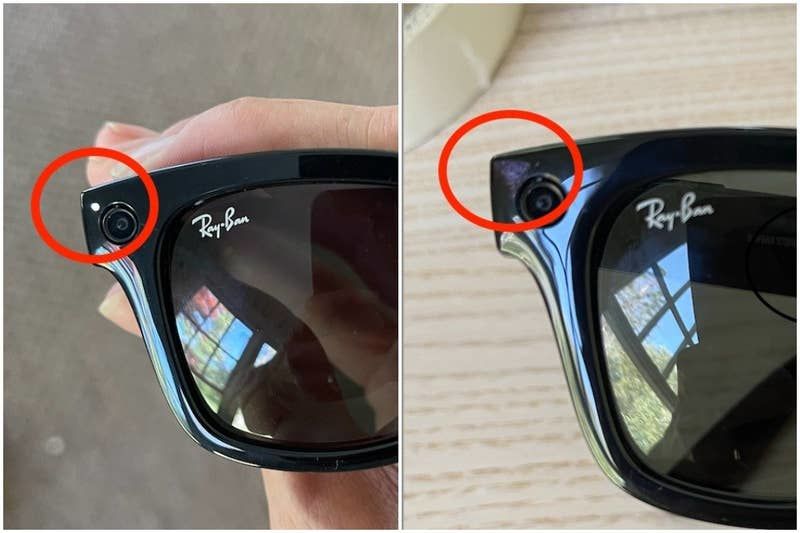
Facebook Is Making Camera Glasses, Ha Ha Oh No
The first thing you'll notice about Facebook’s new camera glasses is that they are not called Facebook Glasses — they are called Ray-Ban Stories. This is because they are made in partnership with Ray-Ban (a cool company that no one hates), and Facebook has had a rough couple of years in the public eye. And “Stories” because, you know, Instagram stories and Facebook stories and also Snapchat "story," lol.
 Facebook has just released Ray-Ban Stories, sunglasses with tiny cameras that take video and photos.
Facebook has just released Ray-Ban Stories, sunglasses with tiny cameras that take video and photos.
If the idea of camera sunglasses seems familiar, perhaps that’s because it sounds like Snapchat Spectacles, which launched in 2016. In what I can only imagine is a loving tribute, Facebook has named its camera sunglasses “Stories” after the other signature product that Facebook/Instagram lifted from Snapchat.
For clarity's sake, I will herein refer to Ray-Ban Stories as “Facebook glasses,” because that’s exactly what I know you are thinking when you read this. The words “Facebook” and “glasses” are making the hair on the back of your neck stand up, right? The phrase “secret spy camera glasses” is making your heart race. The phrase “and it’s made by FACEBOOK!” makes you emit a blood-curdling scream. Knowing that Facebook is discussing building facial recognition into these things curdles the stomach.
I know.
 The Wayfarer style and round of Ray-Ban Stories. They are also available
in three frame styles, as well as different colors, including clear.
The Wayfarer style and round of Ray-Ban Stories. They are also available
in three frame styles, as well as different colors, including clear.
The second thing to make clear is that these glasses do NOT stream to Facebook or post directly to your Facebook or Instagram. They take photos and short videos and send those to a special app on your phone (iOS or Android) that connects to the glasses over Bluetooth.
From that app, called View, you can see all the videos and images, and from there, you can do whatever you want with them — download to your phone’s camera roll, upload to Facebook, and send over text or anywhere else through your phone’s standard image-sharing options.
A few brief notes on how the glasses actually work: The photos and videos actually look really good considering they’re taken from, well, glasses. They have a 5-megapixel camera, along with some onboard processing wizardry that does a lot to sharpen and clean up the images. In my experience, the glasses shot decent images in lower light, and image stabilization was solid enough to prevent video from looking too shaky. Videos only last 30 seconds, but there are some basic tools in the View app to string multiple videos together into montages.
There are speakers in the arms of the glasses; they’re activated by touch, easy to use, and a surprisingly great feature. I went for a stroll listening to an audiobook (the sound quality is perfectly fine for this use), and it was oddly nice to not hassle with AirPods. Because it’s not an in-ear speaker, you can hear some outside noise — I find this actually great for walking around when you do want to be slightly aware of your surroundings, and it’s probably also great for biking.
The glasses charge in their case, which is slightly bigger than a normal sunglasses case but not by that much. They can last for about 6 hours of moderate use before needing to be recharged. I’m fastidious about putting my sunglasses back in their case when I take them off so I don’t break them, so I kept them well charged up.
As far as the weight and comfort of the glasses, they’re only barely heavier than a traditional pair of Wayfarers. I found them to be comfortable, and honestly more so than a few pairs of my regular sunglasses.
 The camera took a pretty nice photo of some flowers. It looks good!
The camera took a pretty nice photo of some flowers. It looks good!
But, look, I know what you’re thinking: Who cares about the audio quality when literally Facebook is making camera glasses, we are doomed. What you care about is privacy, I know.
TL;DR: The privacy features for the glasses wearer are decent; privacy features for the rest of the world? Not so much. The implications for our souls? Hopelessly unclear.
The View app requires a Facebook account to log in, but the content doesn’t directly connect to your account. The video and photos are stored locally on your phone, not sent into Facebook’s servers or the cloud. Basically, if you don’t choose to post those photos to Facebook, Facebook can’t see them or have anything to do with them, which is probably what you want. Well, if you buy Facebook glasses, I don’t really know what you want.
But this obscures a bigger problem. Your data and images may be safe from the prying eyes of Mark Zuckerberg, sure, but the real danger here isn’t to your data — it’s the fact that you’re walking around wearing barely perceptible spy glasses, taking videos and photos of anyone you want, likely without them noticing.
There’s a difference between technology that is merely “creepy” versus something that causes actual harm, and conflating the two is an easy mistake (consider the reaction to the Facebook Portal, a creepy thing, but not harmful). But the potential for real-world harm with these glasses seems obvious and clear. Photographing people without their knowledge is usually merely creepy, but a vengeful ex or jealous partner using this technology to threaten, blackmail, or embarrass someone is harmful. And that second scenario seems likely to play out in real life.
Facebook has anticipated some of these criticisms by not including its name on the product and making sure your content is handled privately. But by removing itself as the chief privacy babadook, it’s turned you — the user — into a strolling privacy violation.
The sleek Wayfarer frame design means that unlike Google Glass or the flashy bright yellow Snapchat Spectacles, these look very much like regular sunglasses. The two small black camera lenses in the corners of the frames largely blend in unless you’re looking up close, maybe face to face with the person wearing them. In a crowd, it’s unlikely people would notice that these are anything other than regular sunnies. Which is the whole point of the Ray-Ban collaboration! To make them look like normal, cool sunglasses!
To make it clear to bystanders that you’re taking a video with your camera glasses, there’s a small white LED light in the frame corner that lights up whenever the camera is on. However, the tiny light is far less obvious than Snapchat’s version, which had a larger swirling light ring while filming.
Although you can’t turn off the light on the glasses or through the app, I was able to do this the old fashion way: I put a tiny piece of masking tape over the LED light and colored the tape black with a Sharpie. It covered it up perfectly.
Sometimes to stop the creeps, you have to become...a creep.
The white LED light (left) indicates recording. I covered it with a piece of tape (right).

Alex Himel, VP of AR at Facebook Reality Labs, informed me over a Zoom chat that taping over the LED light was a violation of the terms of service of the glasses, which prohibit tampering with the device. Be warned.
A Facebook VP informed me that taping over the LED light was a violation of the terms of service of the glasses.
Himel told BuzzFeed News that the LED light was a feature they ADDED after consulting with a handful of privacy groups. The Future of Privacy Forum, which is partially funded by Facebook, was one of those groups, and its legal counsel, Jeremy Greenberg, suggested adding some sort of light as a visual cue. He also suggested some sort of second cue (like touching the frames or using the voice assistant) because he anticipated that someone could disable the light.
But, Greenberg said, there is a real privacy risk to bystanders, and there hasn’t been a product exactly like this before. “These glasses look and feel like typical glasses,” Greenberg told BuzzFeed News. “They look like a cool pair of Ray-Bans, which is definitely a design choice.”
Remember when Facebook CEO Mark Zuckerberg said "the future is private"? LOL.
Camera glasses aren’t new. In addition to Google Glass and Spectacles, you can buy a pair of fake glasses with a hidden camera for about $50 on Amazon. Someone really motivated to do some sort of sneaky surveillance already has an easy (and much cheaper) way to do this. Facebook isn’t inventing the wheel here — they’re just adding a sleeker chassis and leather interior.
Mark Zuckerberg recently posted a memo about his ambitions for a metaverse — a digital experience fully immersed in augmented reality and virtual reality. He enthused that this was the future of both social experience and Facebook. Last month, Facebook announced its first step into the metaverse: a way to do work meetings in VR, where you and your coworkers are in avatar form in a conference room.
Ray-Ban Stories in their current form aren’t exactly metaverse-y; there’s no Minority Report AR/VR component. But it seems likely that Facebook views these glasses as a way to test the market on smart glasses, both to see how people react and to warm up customers to the idea of having people walk around wearing camera glasses.
So, who exactly are Facebook glasses for? I’m not sure exactly, to be honest. They were a fun gadget, but I’m not sure I’d feel comfortable wearing them every day in public. I wore them to walk my son to school and pulled them up onto my head when I got near the school so that no one would notice that my glasses have cameras.
These glasses may be best for parents. Himel described how he likes to use them to capture moments of his young children. Any parent knows that little kids stop doing the cute thing they were just doing as soon as you pull out your phone and start filming. And there is no limit to the number of photos and videos parents want to take of their own kids, even just boring things, never to be shared. They’re also hilarious to let a child use. My 5-year-old wore them running around a family Rosh Hashanah dinner, and the footage was like a charmingly demented version of the restaurant scene in Goodfellas. (Facebook pointed out that the terms of service for this device state that it is for ages 13 and up).
Should you buy a pair? Are they good for me?
Sure, I guess. They’re pretty fun and cool gadgets. I can nearly guarantee you’d have fun playing around with them.
But that isn’t really the issue. It’s not whether or not they’re good for you, it’s whether it’s good for the rest of us with a handful of people walking around with $300 camera glasses. The bad guy here isn’t just Facebook. It’s the creeps, stalkers, and other baddies walking around taking your photo as you walk down the street picking your nose or accidentally showing your butt crack. Is that the world you want to live in?











